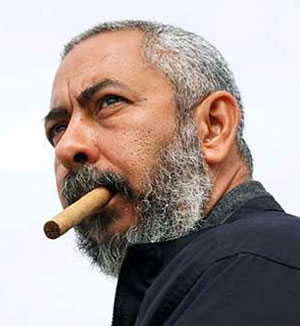 |
| Leonardo Padura Fuentes |
Cubaâs leading novelist is coming to ±«Óătv for two lectures, one in Spanish and one with English translation.
Leonardo Padura Fuentes is an investigative journalist, essayist, and writer of detective fiction. A winner of the international Dashiell Hammett prize, he is best known for his âfour seasonsâ quartet of detective novels featuring flawed protagonist, lieutenant Mario Conde. Known as âthe Count,â heâs a cop who doesnât abide by rules and would leave the force if there wasnât always that last intriguing case to solve. Like Ian Rankinâs music-loving, hard-drinking John Rebus, Mr. Paduraâs gumshoe battles injustice and his own weaknesses.
And, like the John Rebus mysteries, set on the seedy side of Edinburgh, Scotland, Mr. Fuentesâs novels exude a strong sense of place. Through their pages, the reader gets to explore Havana, a city of vintage cars and crumbling balconies, petty crimes and clandestine drinking holes, stifling heat and unrepressed sensuality.
|
His novels are incredibly popular throughout the Spanish-speaking world, and have only been translated into English within the last two years.
âHe is able to deliver social critiques by way of detective novels,â says John Kirk, professor with the Department of Spanish and an old friend of Mr. Paduraâs. The novelist and the Halifax professor met on the invitation of Cuba's Minister of Culture and subsequently collaborated on a collection of interviews with prominent figures of Cuban contemporary culture, Culture and the Cuban Revolution, published in 2001.Â
âIn Cuba, in the two decades since the revolution, thereâs been this tradition in literature of heroes who are pro-government,â continues Dr. Kirk.
âLeonardo makes a break from that tradition by presenting an anti-hero, a detective of flesh and blood. His anti-hero, like Leonardo himself, chooses to stay in Cuba. He offers a criticism of government using popular speech, but also in a high literary vein.â
Born in 1955 in Havana, Mr. Padura faced the question of leaving Cuba, particularly in the late â80s and early â90s when living conditions deteriorated sharply as Russian aid evaporated. But, in a 2006 interview with The Guardian, he says he canât imagine living anywhere else: âIt is my personal decision to live here â I have a very close personal relationship with this town and with this house. I need to live here to work, to write.
"Sometimes, like almost all Cubans, I would like to be far away but sometimes, when I am far away, like almost all Cubans, I would like to go back.â
